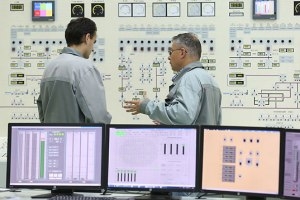Ru
|
Eng
No special concerns from Lithuania about radiation monitoring around Belarusian nuclear power plant
05.01.2017

Lithuania has not expressed any special concerns about the organization of background radiation monitoring around the Belarusian nuclear power plant, BelTA learned from Maria Germenchuk, Head of the National Center for Hydrometeorology, Radioactive Pollution Control, and Environmental Monitoring (Gidromet) of the Belarusian Natural Resources and Environmental Protection Ministry, on 5 January.
According to the source, the Natural Resources and Environmental Protection Ministry and Gidromet, which are responsible for arranging radiation monitoring around the Belarusian nuclear power plant, have heard no special concerns about it, including from Lithuania. “All the measurements of background radiation, chemical composition of the environment near the nuclear power plant, hydrological and meteorological measurements are taken using European standards and norms,” stressed Maria Germenchuk.
The official remarked that measurement labs of the Belarusian national weather service agency are certified for compliance with the ISO/IEC 17025 system (general requirements for the competence of testing and calibration laboratories). As far as meteorological and hydrological measurements are concerned, the measurements are taken in line with recommendations of the World Meteorological Organization. There are no complaints in that regard either, explained the Head of the National Center for Hydrometeorology, Radioactive Pollution Control, and Environmental Monitoring.
An automated system to measure background radiation has already been deployed in pilot mode around the Belarusian nuclear power plant. The system near the Ostrovets nuclear power plant is not unique. Another four systems of the same kind operate near the Chernobyl nuclear power plant, the Smolensk nuclear power plant, the Rovno nuclear power plant, and the Ignalina nuclear power plant. They feed their data to European systems. “Apart from getting information from us directly, Lithuania is also fed data from the European system, this is why they have expressed no concerns about radiation monitoring so far. Belarus and Lithuania mostly debate what environmental pollution consequences may result from an emergency at the Belarusian nuclear power plant and how much their territory and Vilnius in particular will be affected. A number of serious meetings with Lithuanian scientists took place in 2016. We discussed how these emissions are evaluated, what the pollution zones can be. Meanwhile, Belarusian specialists and IAEA experts say that no serious consequences, no considerable pollution will result from the emergencies we discuss,” stated Maria Germenchuk.
The official pointed out that the Lithuanian side intends to secure more guarantees. “The discussion has gone beyond scientific deliberations and has acquired moral and psychological traits because the experience of the Chernobyl catastrophe is important not only for Belarus, but also the entire Europe and Lithuania. It is a negative experience, this is why we are going to constantly step up our efforts in order to demonstrate the situation is favorable and under control through real measurements, real monitoring of background radiation. Discussions with Lithuanians are going to continue for a long time. Our job is to demonstrate all the time the proper level of scientific and technological support for our observations,” she stated.
The Belarusian nuclear power plant is a project to build a VVER-1200 type nuclear power plant 18km away from Ostrovets, Grodno Oblast. The BelNPP will have two power-generating units with the total output capacity of up to 2,400MW (2x1,200MW).
NEWSWIRE
17.07.2024
02.07.2024
27.06.2024
21.06.2024
19.06.2024
06.06.2024
06.06.2024
06.06.2024
06.06.2024
06.06.2024













